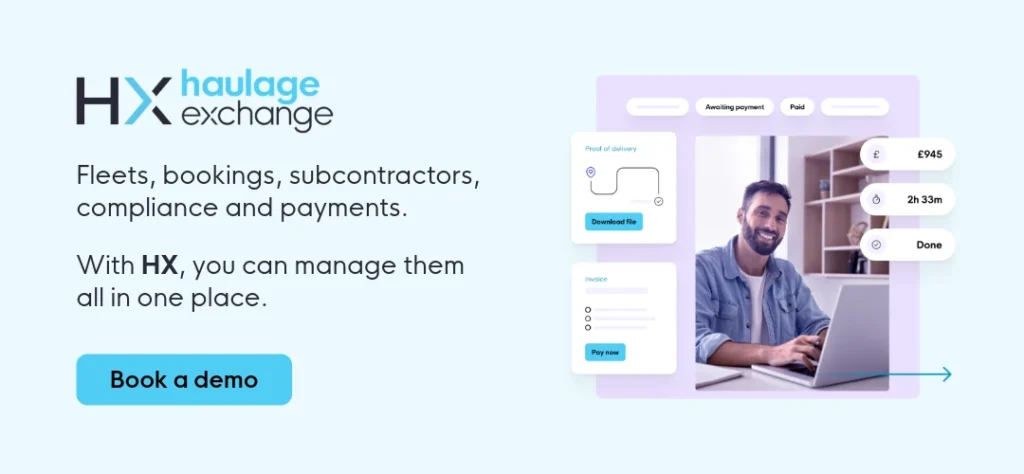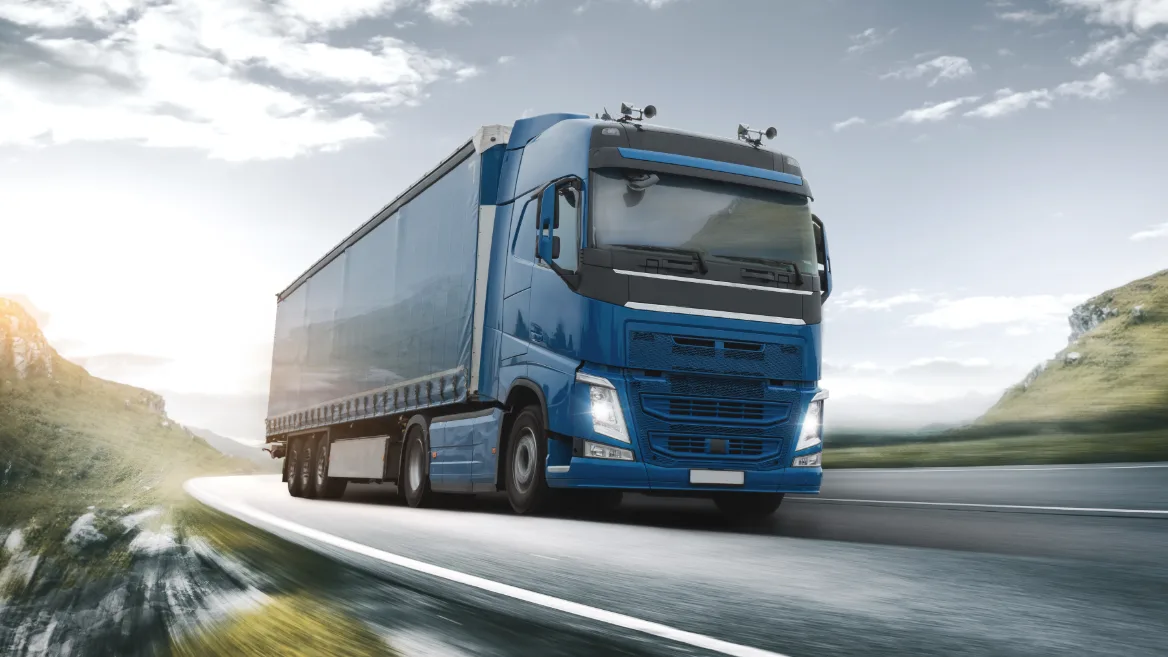A transport manager plays a key role in haulage and logistics, overseeing daily operations and keeping fleets compliant with UK and EU regulations. If your business holds an O-licence, you’re legally required to have a qualified transport manager to keep everything running smoothly.
Whether you’re running a courier fleet or managing multiple haulage drivers, having the right person in this role can improve efficiency, reduce costs, and help avoid penalties. But do you need one, and if so, should you hire, train, or outsource?
Here’s everything you need to know about transport managers (TMs) and how they can benefit your business.
What we’ll cover
What is a transport manager?
A transport manager is responsible for making sure haulage operations comply with legal requirements while keeping fleets efficient and cost-effective.
Their role covers:
- Driver and vehicle compliance – Checking licences, tachograph records, and working hours to follow legal limits.
- Fleet maintenance – Scheduling regular inspections and ensuring vehicles meet safety and emissions standards.
- Operator licence management – Ensuring your HGV operator licence remains valid and updated.
- Route planning and efficiency – Working with dispatch teams to optimise delivery schedules and reduce wasted mileage.
- Cost control – Managing fuel expenses, maintenance budgets, and overall fleet management.
- Driver support – Handling driver risk assessments, training, and recruitment to reduce driver turnover.
When do you need a transport manager?
If you hold a Standard National or Standard International operator licence, you must have a transport manager. UK law requires companies with goods vehicles over 3.5 tonnes to have a professionally competent person in charge of compliance.
There are exceptions for restricted operator licences, but even without a legal requirement, a transport manager can help businesses stay organised, improve efficiency, and avoid costly fines.
For companies expanding into Europe, understanding cabotage rules is equally important, and a TM ensures your fleet operates within legal limits.
How to hire a transport manager
Choosing the right TM depends on your business size, budget, and long-term goals. Some companies prefer to recruit externally, while others develop talent from within or outsource their transport management. Each approach has its advantages and challenges.
1. Hiring externally
Bringing in an experienced TM can provide immediate benefits.
External hires often come with industry knowledge, contacts, and a strong understanding of compliance, which can be particularly useful if your business is growing rapidly or expanding into new areas, such as international haulage or high-risk freight transport.
However, recruitment takes time. Advertising the role, reviewing applications, and conducting interviews can take weeks or even months. Once hired, a new transport manager will need to familiarise themselves with your operations, which can involve an adjustment period for both the manager and your team.
The cost of hiring externally varies depending on experience and location. Salaries typically range between £35,000–£50,000 per year, with higher wages for those managing large fleets or complex operations.
In addition to salary, consider recruitment costs and potential onboarding expenses. Job sites such as Freight Personnel, or TotalJobs, and industry-specific recruitment agencies can help find candidates.
2. Training and promoting from within
If you already have a reliable team member with haulage and logistics experience, training them to become a transport manager can be a cost-effective option.
Promoting from within means you’ll have someone who understands your business, drivers, and daily operations. This can reduce the learning curve and help maintain consistency in your operations.
To qualify, they’ll need to complete the Transport Manager Certificate of Professional Competence (CPC), which is a legal requirement for HGV operator licence holders. The course typically costs between £1,000 and £1,500, with additional fees for exams. Training takes several weeks, depending on the provider, so it’s worth planning for this period to avoid disruption to your operations.
One drawback is that training an internal candidate means temporarily removing them from their usual duties. If they currently handle dispatch, fleet management, or compliance, you’ll need cover for their role while they complete their training.
3. Outsourcing your transport management
For smaller businesses, outsourcing transport management can be a practical alternative to hiring full-time staff. External transport management providers offer compliance support, fleet oversight, and administrative services without the cost of a permanent salary.
This option is particularly useful if you’re starting a new transport company, where cash flow is tight, or for businesses operating a courier fleet rather than heavy goods vehicles.
Costs for outsourcing vary, but typical rates range from £250 to £1,000 per month, depending on the level of service required. Some consultants provide ongoing oversight, while others step in only when compliance checks or audits are due.
Outsourcing can reduce overheads, but it also means less control over daily operations. External providers may not be as invested in your business as an in-house transport manager, and response times may vary depending on their workload.
However, for businesses needing short-term or part-time support, it can be a cost-effective way to stay compliant while focusing on growth.
How to choose the right approach
The best option depends on your business needs.
If you’re expanding or managing a large fleet or dealing with high-risk freight, hiring an external transport manager could provide long-term stability.
If you already have strong internal candidates, training from within can save money and boost employee retention.
For smaller companies, outsourcing might be the most practical way to meet compliance requirements without the full-time commitment.
Whichever route you choose, having a qualified TM is an investment in both compliance and operational efficiency.

How a transport manager can help reduce costs
A transport manager is not just responsible for compliance—they also play a key role in reducing costs and improving efficiency.
From fuel savings to better fleet maintenance, a skilled manager can make a big difference to a haulage company’s bottom line.
1. Fuel efficiency
Fuel is one of the largest expenses for any haulage business.
A TM can cut fuel costs by planning efficient routes, reducing empty miles, and ensuring drivers follow fuel-saving techniques.
By using fleet management tool, telematics and advanced driver assistance systems (ADAS), they can monitor fleet fuel consumption, detect inefficiencies, and implement better driving practices. Encouraging drivers to avoid excessive idling, harsh braking, and high-speed driving can lead to lower fuel bills.
2. Proactive fleet maintenance and repairs
Poor vehicle maintenance leads to breakdowns, unexpected repair bills, and longer downtime.
A TM ensures that all vehicles follow a preventative maintenance schedule, reducing costly emergency repairs.
By tracking service records, monitoring vehicle performance, and scheduling regular inspections, they help extend the lifespan of vehicles and avoid unplanned expenses. This also supports compliance with HGV operator licence requirements.
3. Minimising driver turnover and recruitment
High driver turnover leads to increased recruitment and training expenses.
A well-managed transport operation keeps drivers happy by maintaining fair schedules, avoiding burnout, and ensuring vehicles are safe and comfortable.
A transport manager can also support driver retention by providing training, career progression opportunities, and better working conditions. Investing in drivers reduces hiring costs and improves long-term stability.
4. Optimising fleet capacity
Running empty trucks between jobs is a huge waste of resources.
A TM helps reduce these inefficiencies by optimising load capacity and planning return loads.
Using platforms like Haulage Exchange, your team can find haulage carriers to subcontract work and fill your vehicles for return trips. This keeps trucks on the road with paying loads instead of running empty, improving overall profitability.




